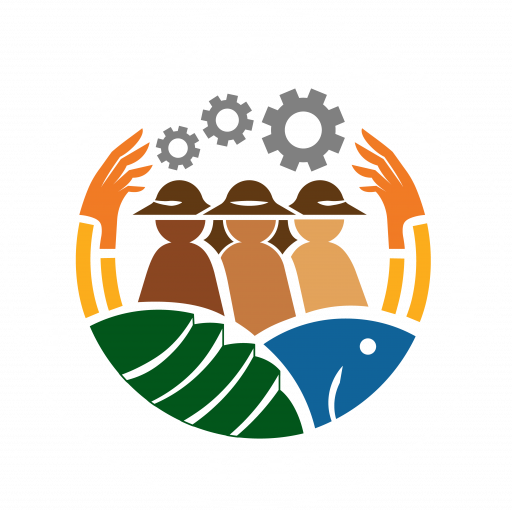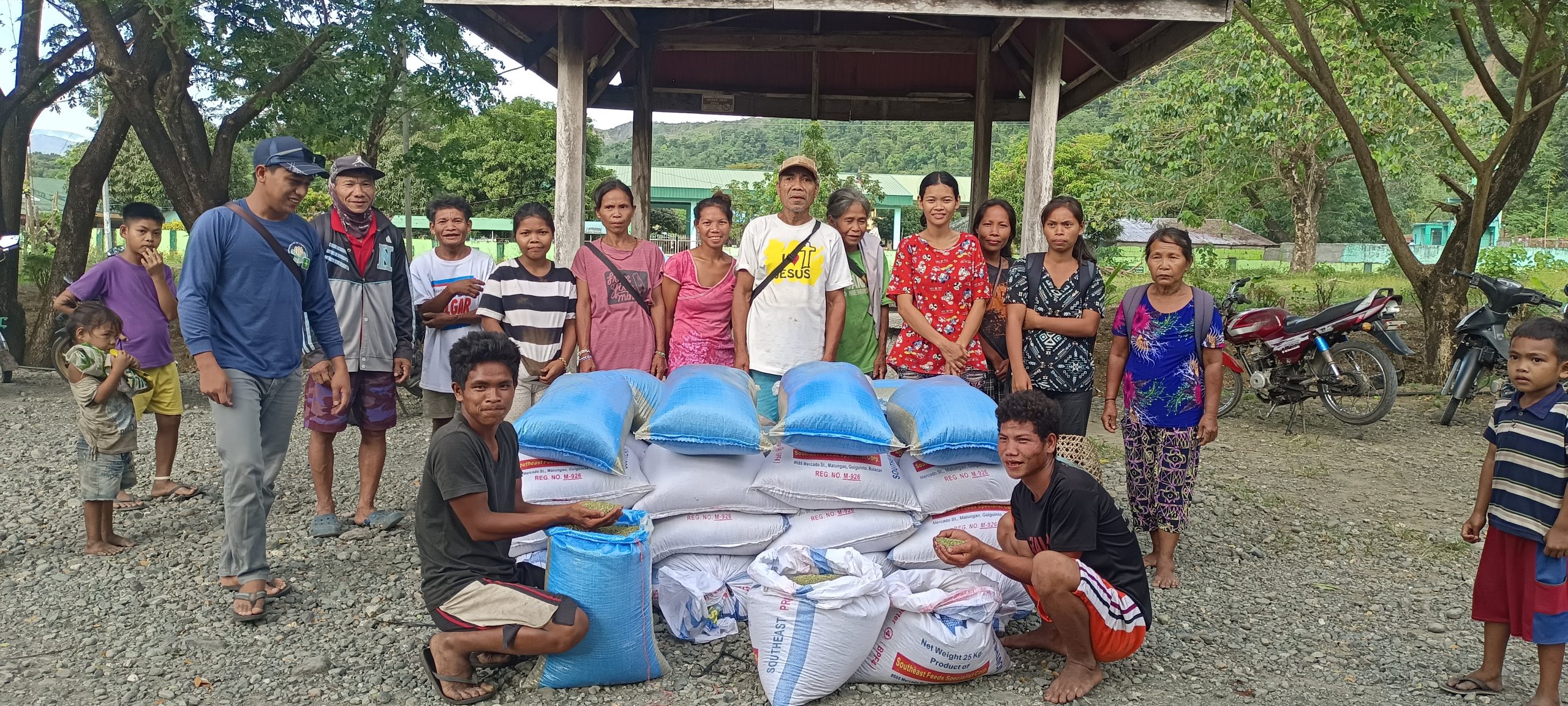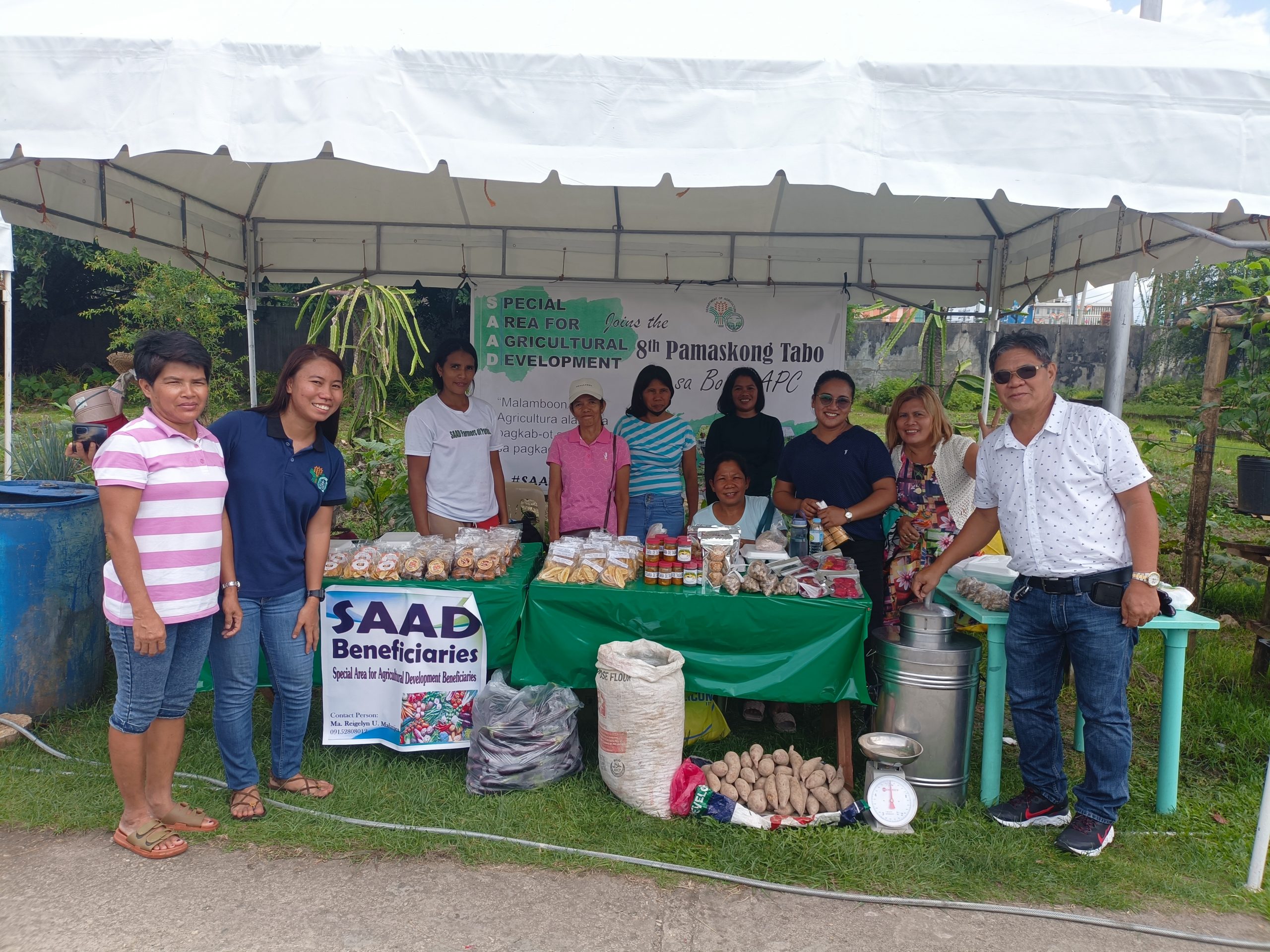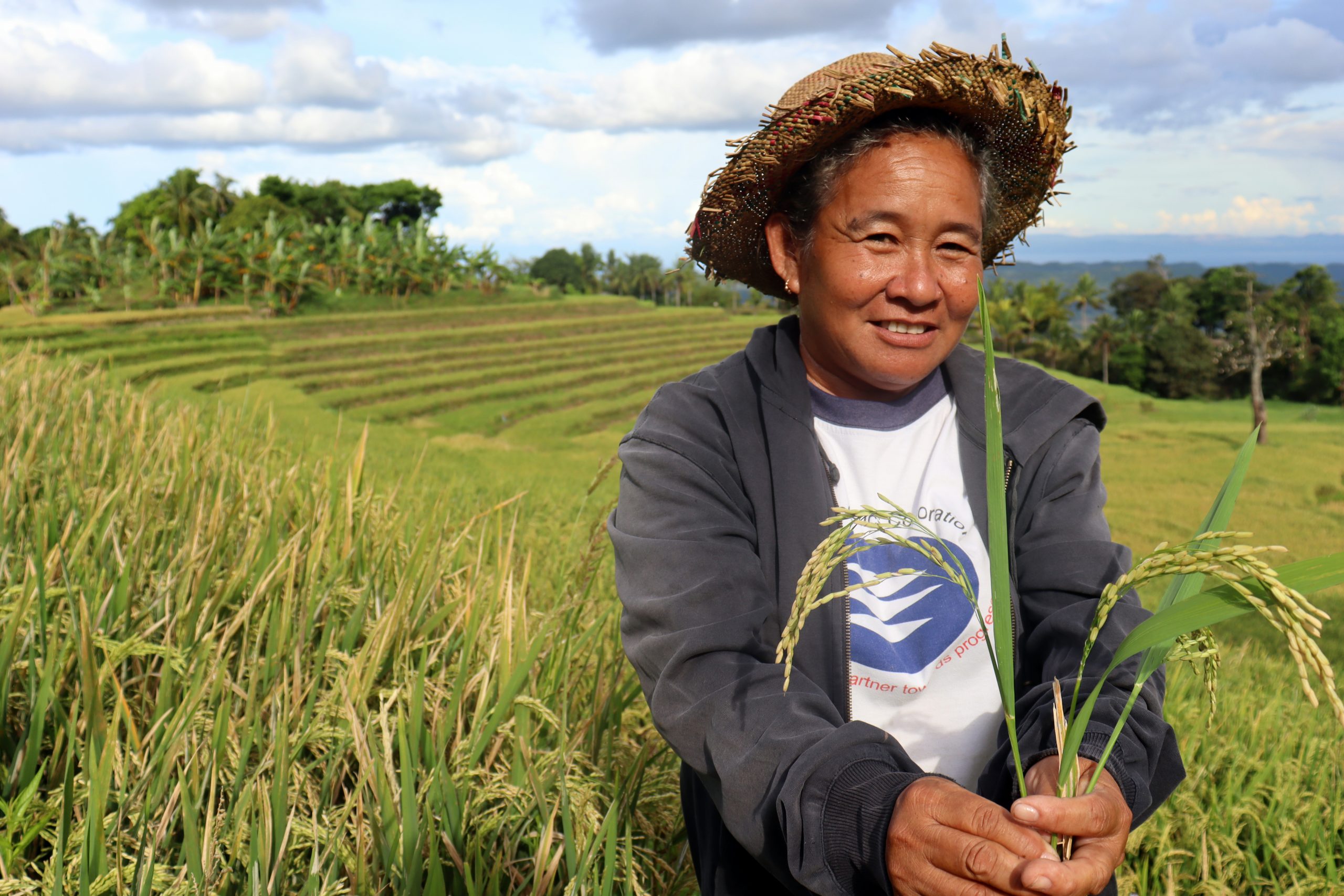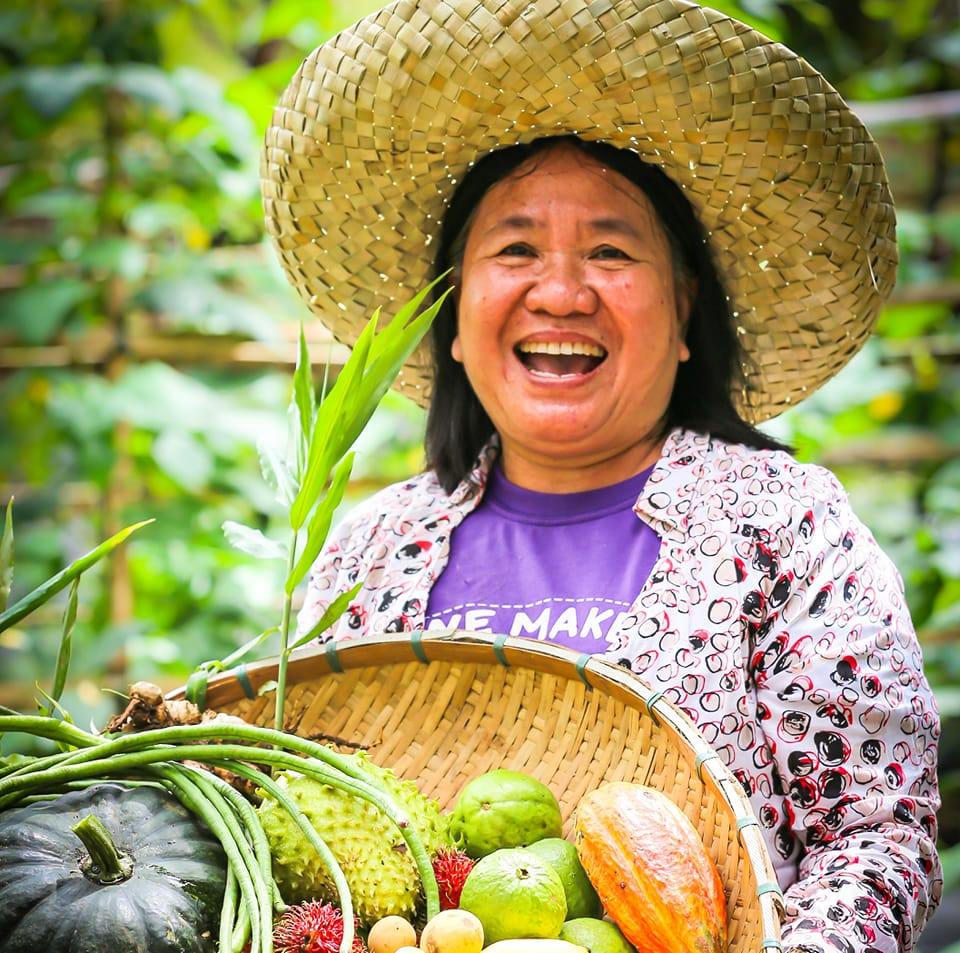Early mornings in the highlands of Davao de Oro is generally cold, dreary affair. In Maragusan, Davao Region’s summer capital—it’s especially chilly, but Ms. Evelyn Baltazar is already up collecting duck eggs from last night’s lay. From Parasanon Multipurpose Cooperative’s (PMPC) flock of mallard ducks, she carefully gathers the freshly laid eggs, ensuring they’re near pristine.
Several kilometers away in the neighboring municipality of New Bataan, the same activity takes place: this time, it’s Mr. Orlando Balliner, chairperson of Andap Small Coconut Farmers Association, doing the collection.
Last year, PMPC and Andap Small Coconut Farmers Association were beneficiaries of SAAD 11’s mallard duck production project. In October 2021, the program granted the FAs 135 mallard ducks, 108 of which were, at the time, pullets. The rest were drakes.
Alongside, the program supplemented the birds with feeds and biologics. Forty bags of layer crumble were delivered in three tranches from October 2021 to January 2022. The biologics consisted of multivitamins, dewormers, and antibiotics.
In January 2022, the pullets started producing eggs. Usually, they lay their eggs between the hours of 1:00 to 4:00 in the morning. Thus, both farmers’ associations (FAs) have set a collection schedule that begins at 5am.
“Tag-tulo o upat ka adlaw amoang koleksiyon, mao jud na. Kay kung musobra ana, dili na mudawat amoang ginabaligyaan” (Our collection is three-four days only. If the eggs are older than that, our buyer won’t accept them), Mr. Balliner related. Both FAs sell the eggs as is to balut merchants downtown.
From Andap, New Bataan, he travels 15 kilometers to Compostela delivering 8-12 trays eggs once or twice a week. PMPC does the same, although to a different merchant in another municipality. As of writing, Andap Small Coconut FA has grossed Php 111,531.50 from selling duck eggs, while PMPC at Php 102,658.50.
“Gi-atiman namo ug tarong. Nag-revolving mi ug pakaon hangtod nangitlog sila ug niabot ug ingon ana kadaghan” (We took care of it. There is a revolving pool of people that feed until they start laying eggs, up until it became this many), Ms. Baltazar quipped when asked about their practices. PMPC previously decided to have nine people in circulation to man their stock.
At peak production, PMPC harvested 103 eggs, with the New Bataan FA at 10 eggs less. These days, the former’s egg collection ranges from 60-90 pieces while the latter could gather up to 80 on a good day.
“Sugod tung nangitlog ni sila, nakaingon mi nga among hinay-hinayan ug improve hangtod among mga miembro, naa na puy mailaha” (When they started laying, we realized that we needed to pursue sustaining them to increase the number of the flock until every member has their own), Mr. Balliner mused.
SAAD 11 transitioned from granting livelihood projects to individual farmers to identified farmer-groups in 2021. Mallard duck raising was selected as a feasible project for Geographically Isolated and Disadvantaged Areas (GIDAs) and End Local Communist Armed Conflict (ELCAC) farmers because of the poultry’s hardiness and quick turnover. This year, the program granted the same project to 10 FAs across the province.
Parasanon Multipurpose Cooperative (PMPC)
Last year, PMPC received mallard ducks and abaca inputs. The abaca harvest is expected in the first quarter of 2022. The mallard ducks, in the meantime, provide additional income for the FA.
“Amoang plano karon, magpapiso mi kay pananglit dili na mangitlog ang mga itik, naa mi ikapuli” (Our plan is to hatch ducklings so that when the hens are culled, we’ll have a new batch to sustain egg production), PMPC Chairperson Marcela Capin said. Ms. Capin is one of nine caretakers the cooperative chose for the ducks.
As a standard, ducks are culled once it molts excessively or has prolapsed (when a portion of a hen’s oviduct/uterine tube ends up outside her body and doesn’t retract back inside). It takes one to two years from when the hen started laying eggs to become unproductive.
Fortunately for PMPC, the project includes an incubator, which the cooperative is actively using. Previously, they’ve hatched 32 ducklings. Twenty-eight out of those were bought by members at Php 22 each.
“Nagpasalamat jud mi sa DA ug SAAD kay daghan mi ug nadawat project gikan sa ilaha” (We’re thankful to DA and SAAD because we were blessed with projects), Ms. Capin added.
The cooperative has collected 9,777 eggs in seven months from the remaining flock of 133. The eggs were sold at Php 10.50 per piece. Ms. Baltazar, the cooperative’s bookkeeper, reported Php 52,642 net income.Table 1. PMPC’s egg production income January-July 2022
| Year | Number of Eggs Gathered (pcs) |
Gross Income (Php) |
Expenses (Php) |
Net Income (Php) |
| 2022 | 9,777 | 102,658.50 | 50,866.50 | 52,542.00 |
“Kalipay nato sa SAAD nga makita atoang mga FA nga nagdasig ug atiman sa atoang mga proyekto. Unta ma-sustain ni nila, kay ang tumong na sa SAAD karon, towards CBE formation na ta” (It’s our joy in SAAD to see that our FAs are enthusiastic about maintaining our projects. We hope they do sustain it because SAAD is now gearing towards CBE formation), Ms. Naomi Lamata, SAAD Focal for Region 11, commented.
Andap Small Coconut Farmers Association
While PMPC had a fixed price when selling their eggs, Andap Small Coconut Farmers Association had a different story. When the FA started to sell their harvest, the eggs were priced at Php 8.50. For smaller eggs not up to the buyer’s standard, the purchasing price was lower.
This didn’t stop the FA from supplying again to the same buyer, and in this case, persistence was key as after a few weeks of delivering eggs consistently, the buyer raised the price to Php 10.50.
“Kugi ra jud amoang kapital. Ug gisunod namo ang gi-lecture sa amoa. Wa na mi nibalhin ug lain buyer kay siya, perme mupalit way sipyat. Sigurado mi sa iyaha” (Our capital is diligence. And we followed what we learned from the lecture. We didn’t change buyers because we were sure that our buyer won’t fail us), Mr. Balliner said.
Since January, the FA has harvested 12,387 eggs bought at varying prices ranging from Php 6.50-10.50.Table 2. Andap Small Coconut FA’s egg production income January to July 2022
| Year | Number of Eggs Gathered (pcs) |
Gross Income (Php) |
Expenses (Php) |
Net Income (Php) |
| 2022 | 12,387 | 111,531.50 | 90,000.00 | 21,531.00 |
Mr. Balliner credits the income to proper feeding. In fact, he spent most on it in hopes to get the money rolling. Similar to fuel, commercial animal feed has seen exponential price hikes due to supply constraints brought about by the Russian invasion of Ukraine.
According to a Bloomberg report, prices for soybean meal, a key component to most poultry feed, rose to its highest in seven years because of protectionism. With decreasing harvests across continents, governments worldwide are tightening local crop supplies exportation to prepare for an impending food shortage. The war exacerbated the situation.
Last July, SAAD delivered 25 sacks of layer crumble to support the FA. The additional implements should last at most three months, its sole purpose to increase the FAs earning potential.
“Salamat jud kaayo sa SAAD kay makabawi-bawi na jud mi. Padaghanon namo ni kay klaro kaayo nga naay mabalik” (Very thankful to SAAD because with this , we can increase our net income. Surely we’ll increase because it’s clear that there’s money in this), he said.
“Tumong ug tinguha sa SAAD tung una pa nga madugangan ang panginabuhian sa mga mag-uuma sa hilagyong dapit (SAAD has always been about supplementing our farmers’ income streams in hinterland areas),” Ms. Lamata added.
SAAD 11 FY 2022 Implementation
This year, SAAD 11 identified 46 GIDA and ELCAC FAs in the province to receive livelihood projects. Andap Small Coconut FA, one of the 46, has already received upgraded native chicken. Their crop-based intervention of Open-Pollinated Variety (OPV) corn is on the way. Meanwhile, PMPC has entered its Community-based Enterprise (CBE) phase under SAAD, with the program monitoring and providing technical support of interventions given previously.
Asked about what he thought of the SAAD program, Mr. Balliner echoed the region’s informal slogan, “Ok kaayo! Sa ako, ok kaayo ang dagan sa proyekto, basta naa lang juy interes ug kakugi.”
(In my part, the project is doing really well. You just need to be interested and hardworking).
The phrase Ok kaayo! is a popular Bisayan expression to convey delight in things going swimmingly. It translates literally to “very OK”.
SAAD 11 is positive that both FAs will sustain the project. The program provides continued technical support to make the most out of the hens’ productivity.
As Mr. Balliner closes the bamboo gate to the ducks’ pen, he does so with great expectations that tomorrow, in the cold, early mornings of Davao de Oro, he’ll find a batch of duck eggs ready for collection again. ###
Writer: James Brian R. Flaga, SAAD RPMSO 11 Information Officer
Source: DA-SAAD Davao de Oro
